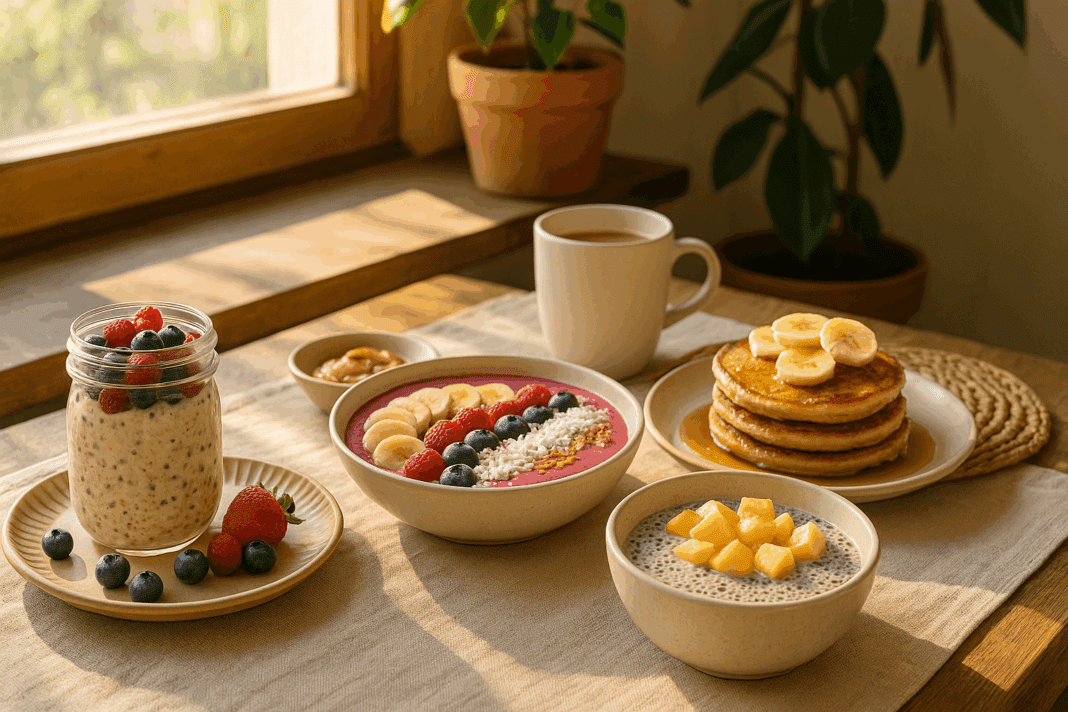Rethinking Breakfast: Sweet Can Be Healthy, Too
In today’s fast-paced world, breakfast often becomes an afterthought—grabbed hastily or skipped altogether. For those who do eat breakfast, sweet options are often synonymous with sugary cereals, pastries, or syrup-laden pancakes that offer little nutritional value. But a growing movement among nutrition experts is shifting the narrative, proving that a healthy sweet breakfast can be both satisfying and good for you.
Sweet flavors are comforting and familiar, but their nutritional profile depends on the ingredients behind them. Using whole-food sources of sweetness—like fresh fruit, cinnamon, or a hint of maple syrup—makes it entirely possible to enjoy indulgent flavors without spiking your blood sugar or sacrificing your health. Starting your day with the right balance of natural sweetness, protein, and fiber supports stable energy levels, better mood, and improved cognitive function.
When you approach sweet breakfasts through a wellness lens, they become a powerful part of your healthy lifestyle rather than a nutritional setback. With the right preparation and insight, even desserts like pancakes and muffins can be transformed into balanced meals that energize rather than exhaust.
You may also like: Smart, Simple Recipes for a Balanced Diet: Expert-Backed Healthy Food Dishes to Support Everyday Wellness
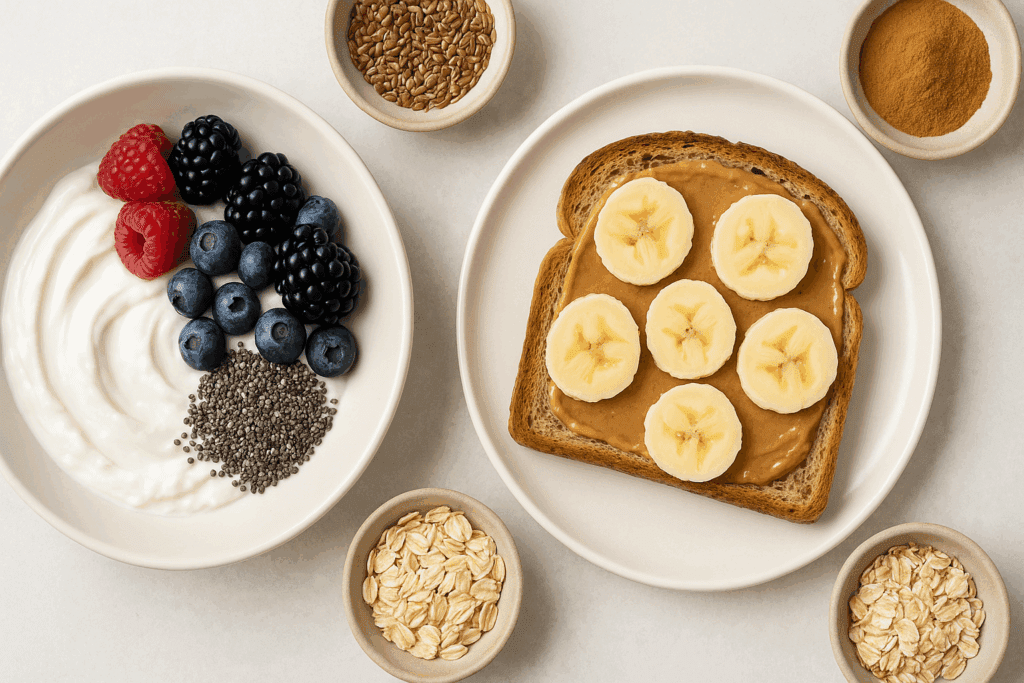
The Nutritional Science Behind Sweet Mornings
Sweetness is one of the most universally preferred tastes, and there’s a biological reason for it. Our brains are wired to enjoy sugar because it signals a quick source of energy. However, not all sweet sources are created equal. The type of carbohydrate and how it’s consumed plays a crucial role in how your body responds. Whole foods high in fiber—such as oats, fruits, and seeds—digest more slowly and release glucose gradually, supporting stable energy and prolonged satiety.
A well-composed healthy sweet breakfast blends naturally sweet elements with complex carbohydrates, healthy fats, and protein. This mix prevents sugar crashes and helps avoid the mid-morning hunger that often leads to snacking or overeating later in the day. Adding protein-rich components like Greek yogurt, almond butter, or plant-based protein powder can enhance satiety and improve nutrient absorption.
Even more compelling is the mental health benefit. Research suggests that food enjoyment impacts psychological satisfaction and emotional regulation. If a sweet breakfast brings joy and comfort, and it’s made with health-conscious ingredients, it supports a holistic model of wellness that honors both physical and emotional needs.
From Dessert to Delightful: Avoiding the Pitfalls of Sugary Breakfasts
Traditional sweet breakfasts often rely heavily on refined sugar and processed flour—ingredients that strip away nutrients and contribute to energy crashes. These types of meals may taste good in the moment, but they don’t serve your health in the long term. The key to transforming indulgent options into healthy sweet breakfast ideas lies in ingredient swaps and smart preparation techniques.
Instead of syrup-drenched pancakes, try making your own with oat flour and mashed banana. Replace sugary granola with a homemade version using rolled oats, chopped nuts, and a touch of honey or date syrup. Choosing unsweetened plant-based milk and yogurt can also help limit unnecessary added sugars. These changes may seem small, but they make a meaningful difference in how your body processes breakfast.
Beyond sugar content, it’s essential to pay attention to portion sizes and nutrient balance. Even a breakfast made with wholesome ingredients can tip into the overly indulgent category if eaten without mindfulness. Designing meals that are as satisfying as they are balanced ensures that your morning sweet fix is one that supports your health, rather than undermining it.
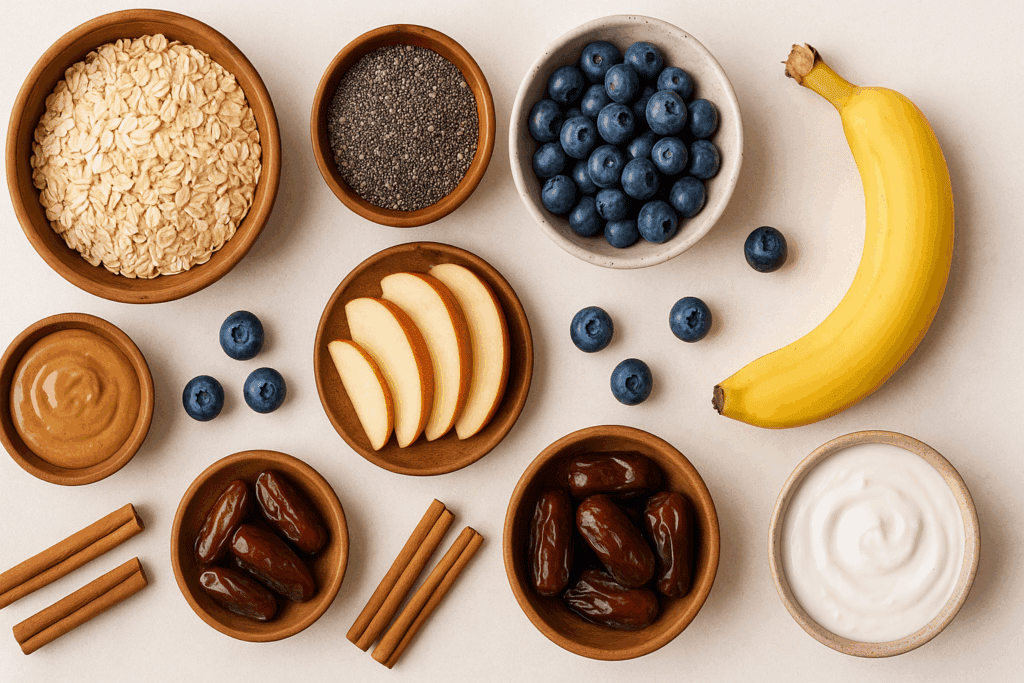
Core Ingredients for Crafting the Perfect Healthy Sweet Breakfast
To create truly nourishing healthy sweet breakfast recipes, it all starts with what goes into them. Whole, minimally processed ingredients offer the best foundation. Fruits like berries, bananas, apples, and dates provide natural sweetness along with fiber and antioxidants. Oats, quinoa, and whole-grain flours deliver slow-burning energy to sustain you throughout the morning.
Protein sources are equally important. Consider unsweetened Greek yogurt, nut butters, chia seeds, or plant-based protein powders. These ingredients don’t just increase satiety—they also support muscle repair and hormone balance. When mixed with healthy fats from sources like avocado, almonds, or flaxseed, the result is a deliciously complete meal that’s satisfying on every level.
Flavor enhancers such as cinnamon, vanilla, and nutmeg can mimic the sweetness of sugar without adding any calories or blood sugar spikes. These spices elevate the sensory experience of your breakfast while supporting blood sugar stability and even offering antioxidant benefits. Building meals with these ingredients ensures that your healthy sweet breakfast ideas are rooted in both flavor and function.
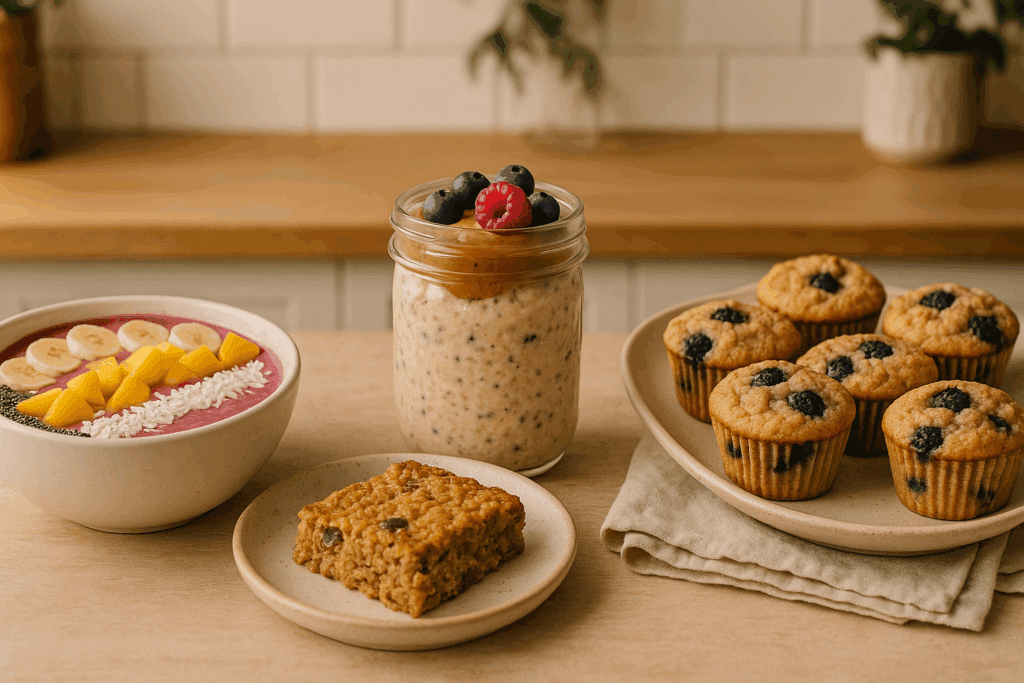
Tried-and-True Healthy Sweet Breakfast Recipes You’ll Love
The best healthy sweet breakfast recipes are those that are easy to make, adaptable, and deeply satisfying. One perennial favorite is the overnight oats parfait. Simply combine rolled oats, almond milk, mashed banana, and chia seeds in a jar, and let it sit overnight. In the morning, top it with berries, a sprinkle of granola, and a swirl of almond butter for a no-fuss meal that feels indulgent but is packed with nutrition.
Smoothie bowls are another great option. Blend frozen mango with spinach, a splash of coconut water, and a scoop of protein powder. Pour into a bowl and decorate with sliced kiwi, pomegranate seeds, and coconut flakes for a meal that’s as beautiful as it is beneficial. If you prefer baked goods, try almond flour muffins sweetened with dates and blueberries—they’re great for batch cooking and freezing.
Warm options like baked oatmeal or banana quinoa porridge offer comfort and satisfaction. You can make a week’s worth of baked oatmeal in advance and reheat portions as needed. These dishes prove that healthy sweet breakfast ideas don’t require sacrificing flavor or texture. In fact, many of them rival traditional desserts—minus the sugar crash.
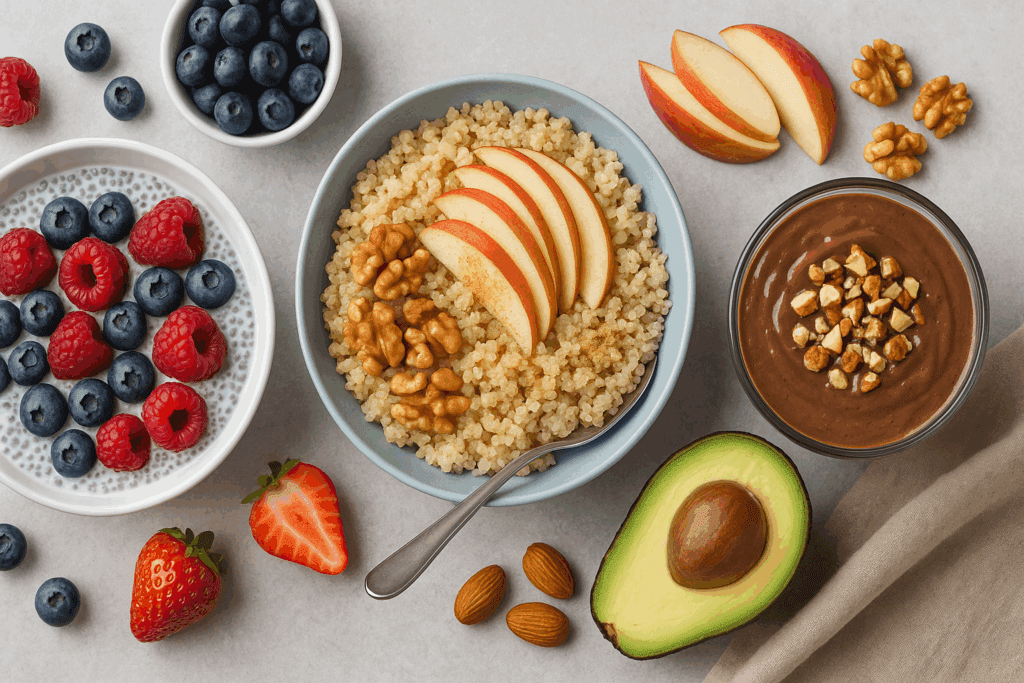
Sweet Breakfasts That Fit Special Diets and Health Goals
A wide array of healthy sweet breakfast recipes can be tailored to suit specific dietary needs, including vegan, gluten-free, and low-glycemic diets. For vegan eaters, ingredients like coconut yogurt, flax eggs, almond milk, and nut butters open up endless possibilities. Vegan banana pancakes or chia seed pudding topped with berries offer indulgence without compromise.
Gluten-free options abound as well. Buckwheat groats, quinoa flakes, and certified gluten-free oats provide complex carbs for energy, while sweet potatoes can be used in baked recipes to add moisture and natural sweetness. Combine these with fruits and seeds for a satisfying meal that respects your body’s needs.
Those aiming for low-glycemic meals benefit from combining high-fiber ingredients with a modest amount of healthy fat and protein. Think chia pudding topped with raspberries and almonds, or a smoothie made from avocado, spinach, and unsweetened cacao. These meals help keep blood sugar stable while delivering all the pleasure of a sweet morning start.
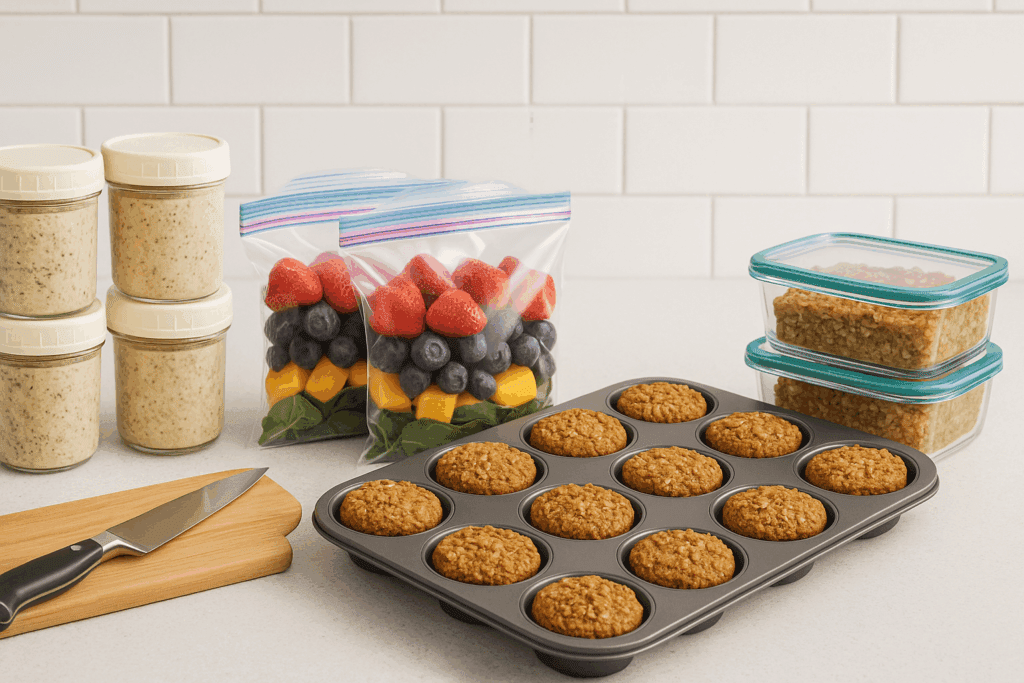
How to Prep Sweet Breakfasts for a Stress-Free Week
Busy mornings don’t have to mean compromising on nutrition. Many healthy sweet breakfast ideas are ideal for meal prep and batch cooking. Overnight oats can be prepped several days ahead and stored in individual jars for convenience. With a few ingredient swaps, you can change up the flavors each day to avoid monotony—try apple cinnamon one day and tropical mango coconut the next.
Freezer-friendly options like banana oat muffins or homemade granola bars are also great for make-ahead planning. These can be reheated or packed into a work bag for on-the-go nourishment. Even smoothie ingredients can be portioned into freezer bags, so all you need to do in the morning is blend and enjoy.
Batch prepping reduces decision fatigue, saves time, and ensures that your first meal of the day is both health-promoting and enjoyable. When your freezer or fridge is stocked with delicious healthy sweet breakfast recipes, you’re more likely to make choices that align with your wellness goals.
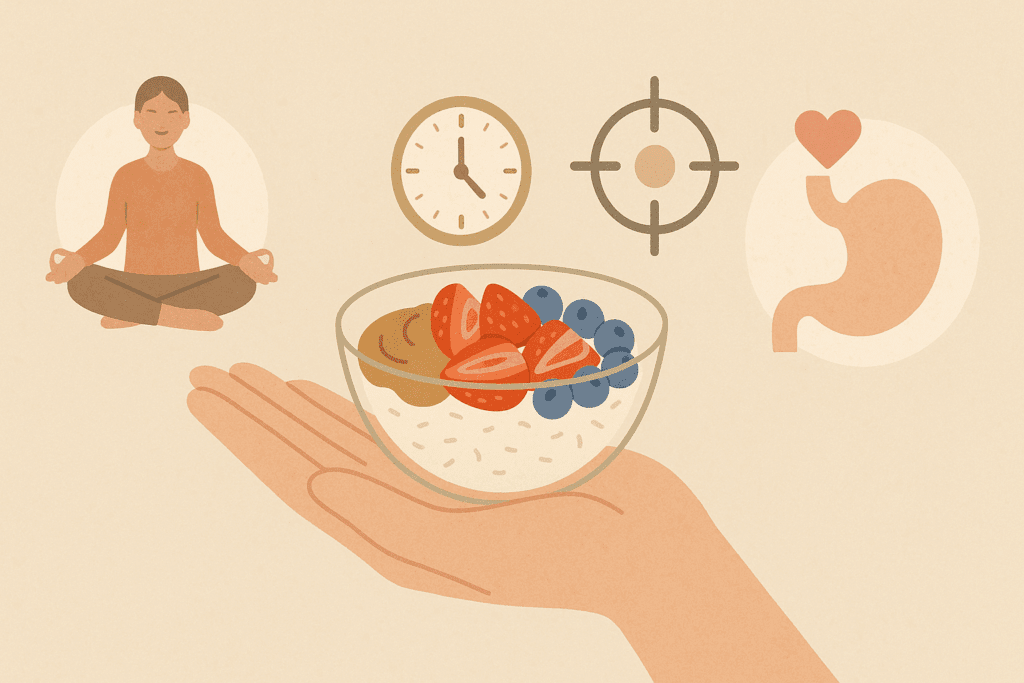
Mindful Eating and Portion Control: The Missing Ingredient
While ingredients matter, how you eat is just as important. Mindful eating means slowing down, savoring your meal, and tuning into your body’s hunger and fullness cues. This practice is particularly important when eating sweet foods, as it’s easy to overconsume them due to their pleasurable nature.
Start your day with a balanced portion of a healthy sweet breakfast, and give yourself time to enjoy it without distractions. Chew thoroughly and notice the textures and flavors. This helps with digestion and reduces the likelihood of overeating later in the day. Incorporating protein and fiber-rich ingredients not only boosts nutrition but also makes it easier to eat mindfully by enhancing fullness.
Over time, mindfulness at breakfast can ripple into other meals and choices, strengthening your overall commitment to health. It also reconnects you to the joy of eating, which is a fundamental part of sustained wellness.
Why Seasonality and Local Produce Make Your Breakfast Better
There’s something deeply satisfying about using fresh, seasonal ingredients in your morning routine. Not only are they more flavorful, but they also tend to be more nutritious due to shorter transport and storage times. In-season fruits like summer berries, autumn apples, or spring peaches can transform your breakfast into a celebration of nature’s bounty.
Local ingredients also support sustainable farming practices and community health. Whether it’s honey from a nearby beekeeper or apples from a local orchard, incorporating these foods adds a sense of connection and purpose to your meal. These choices enhance both the flavor and nutritional value of your healthy sweet breakfast.
Try visiting a farmers market to inspire new breakfast ideas based on what’s available. A fresh batch of blueberries can turn into oat pancakes, while ripe peaches may inspire a baked oatmeal casserole. These seasonal shifts keep your meals exciting and nutritionally diverse year-round.
A Ritual Worth Keeping: The Lasting Power of a Sweet and Healthy Start
Breakfast is more than just a meal—it’s a ritual that influences your mindset, metabolism, and mood. By prioritizing a healthy sweet breakfast, you’re investing in your future health and well-being in a way that feels comforting rather than restrictive. This shift in mindset turns everyday eating into an act of self-care.
Consistency is key, and that doesn’t mean eating the same thing every day. Instead, build a rotation of go-to healthy sweet breakfast ideas that you genuinely enjoy and can rely on. Keep ingredients on hand, prep when you can, and listen to your body’s signals. Over time, these habits will become second nature, supporting you through busy seasons and slow mornings alike.
When your first meal of the day nourishes both your body and soul, it becomes the foundation for all the choices that follow. You start each day from a place of energy, intention, and joy—which is the best kind of momentum to carry forward.
Frequently Asked Questions: Healthy Sweet Breakfasts
Fresh perspectives and expert insights on crafting nutritious, sweet morning meals
1. What are some uncommon ingredients I can use in a healthy sweet breakfast to add variety?
A healthy sweet breakfast doesn’t have to rely solely on bananas, berries, or oats. There are lesser-known but nutrient-rich ingredients that can bring new life to your breakfast routine. Amaranth, a high-protein ancient grain, offers a pleasantly nutty flavor when cooked into porridge. Lucuma powder, a natural sweetener from Peru, adds a caramel-like taste and is rich in antioxidants. Japanese sweet potatoes, with their naturally rich and honeyed flavor, can be mashed or blended into smoothies for a naturally sweet, fiber-dense base. Integrating these options into your healthy sweet breakfast ideas expands your nutritional variety while keeping your meals exciting and flavorful.
2. Can a healthy sweet breakfast support muscle recovery after morning workouts?
Yes, a well-structured healthy sweet breakfast can absolutely aid post-exercise recovery, especially when it includes a balanced ratio of carbohydrates and protein. After a workout, your muscles are primed to absorb nutrients for repair and growth. Healthy sweet breakfast recipes that include ingredients like Greek yogurt, nut butters, or protein-rich tofu can enhance muscle recovery while still satisfying sweet cravings. Pairing these with high-glycemic fruits like mango or pineapple helps replenish glycogen stores quickly. This synergy makes a sweet post-workout breakfast both functional and enjoyable, especially when you want a meal that feels like a treat but performs like fuel.
3. How can I encourage children to enjoy healthy sweet breakfast ideas instead of sugary cereals?
Children are naturally drawn to sweetness, so the challenge lies in substituting nutrient-poor sugary cereals with equally tasty but healthier alternatives. Start by involving kids in the breakfast-making process—letting them decorate smoothie bowls or layer yogurt parfaits builds excitement. Use familiar flavors like cinnamon, vanilla, or cocoa in recipes such as banana oat pancakes or homemade baked oatmeal bars. Even healthy sweet breakfast recipes like apple cinnamon quinoa bowls can win over young taste buds when presented with fun toppings like dried cranberries or coconut flakes. Creating positive associations through presentation and taste can help establish lifelong habits built on nutritious morning choices.
4. What are some culturally diverse inspirations for healthy sweet breakfasts?
Looking at global cuisine is a fantastic way to find fresh inspiration for your healthy sweet breakfast ideas. For instance, Indian cuisine features sweetened semolina dishes like suji halwa, which can be healthified using whole grain semolina, ghee alternatives, and jaggery. In Middle Eastern traditions, date and tahini spreads offer a naturally sweet, nutrient-rich topping for flatbreads or porridge. Japanese breakfasts may include sweet red bean paste or miso-glazed sweet potatoes. Exploring these cultural traditions can provide a deeper appreciation for naturally sweet breakfast options and inspire creative, globally influenced recipes that fit within a modern, health-focused lifestyle.
5. Are there healthy sweet breakfast recipes that travel well for commutes or office mornings?
Absolutely—there’s no shortage of portable healthy sweet breakfast options that can be prepared in advance and taken on the go. Chia seed puddings in mason jars, overnight oats in lidded containers, and baked protein muffins made with bananas, oats, and flaxseed all travel well and maintain freshness. Breakfast cookies made with almond flour, dates, and dried fruits are also a great option that fits in a lunchbox or purse. For something more drinkable, blend a fruit smoothie the night before and store it in a thermos to keep it cold until morning. These practical solutions make sticking to your healthy sweet breakfast ideas effortless, even on the busiest days.
6. How can I make healthy sweet breakfasts more budget-friendly without sacrificing nutrition?
Affordability and nutrition can absolutely go hand in hand when it comes to healthy sweet breakfast recipes. Buying ingredients like oats, bananas, and frozen fruits in bulk is a cost-effective way to ensure you always have staples on hand. Instead of pricey nut butters, try using sunflower seed butter or homemade versions. Flavored yogurts can be replaced with plain yogurt mixed with a touch of honey and cinnamon. Even date paste—an excellent sweetener—can be made at home for a fraction of store-bought prices. The key is to identify versatile, multi-use ingredients that can stretch across multiple meals, keeping your healthy sweet breakfast ideas both economical and nourishing.
7. Can healthy sweet breakfasts support hormone balance or women’s health?
Yes, the right combination of nutrients in a healthy sweet breakfast can play a supportive role in hormonal regulation. Meals that include healthy fats (like flaxseeds, chia seeds, or almond butter) provide essential fatty acids that are crucial for hormone synthesis. Complex carbs from oats or sweet potatoes help stabilize insulin levels, which is vital for maintaining hormonal balance, particularly in women with PCOS or other endocrine conditions. Additionally, incorporating phytoestrogens from ingredients like soy yogurt or flax can be beneficial for estrogen balance. Crafting healthy sweet breakfast recipes with these functional ingredients helps support energy, mood, and cycle regularity over time.
8. What’s the future of healthy sweet breakfast innovation in the food industry?
The landscape for healthy sweet breakfast innovation is rapidly evolving, driven by consumer demand for convenient, clean-label, and functional foods. Expect to see an increase in plant-based ready-to-eat options, such as probiotic-rich dairy alternatives, high-protein oat cups, and fruit-sweetened baked goods. Functional ingredients like adaptogens, collagen, and superfood powders are also making their way into mainstream breakfast products. Moreover, sustainable packaging and locally sourced ingredients are becoming more important to health-conscious consumers. Brands are beginning to design healthy sweet breakfast ideas that go beyond nutrition to align with broader lifestyle values—environmental responsibility, transparency, and cultural inclusivity.
9. How can sweet breakfasts impact long-term eating habits or food cravings?
Regularly enjoying a healthy sweet breakfast may help reduce unhealthy cravings later in the day, especially for processed sugars. Starting the day with a satisfying sweet flavor—derived from whole foods—can provide psychological satisfaction and prevent the sense of deprivation that often leads to afternoon binges. Over time, these habits retrain your palate to appreciate more subtle natural sweetness rather than relying on refined sugar. Incorporating high-fiber and protein-rich components also helps balance blood sugar, further reducing the likelihood of cravings. Thus, sticking to well-planned healthy sweet breakfast recipes can set a positive tone for your entire dietary pattern.
10. What are some creative ways to repurpose leftovers into a healthy sweet breakfast?
Leftovers aren’t just for lunch or dinner—they can be ingeniously transformed into healthy sweet breakfasts. Roasted sweet potatoes from the night before can be mashed into oats or blended into smoothies for a creamy, nutrient-dense base. Cooked quinoa can be turned into a breakfast bowl with cinnamon, raisins, and almond milk. Even leftover cooked apples or berries from dessert can be repurposed into a warm compote for pancakes or toast. By thinking outside the box, you can turn what’s in your fridge into unexpected but delicious healthy sweet breakfast ideas that reduce food waste and keep your morning routine exciting.
Conclusion: A Healthy Sweet Breakfast Can Be the Game-Changer Your Wellness Routine Needs
Embracing the concept of a healthy sweet breakfast allows you to enjoy indulgent flavors without compromising your nutritional goals. By focusing on whole ingredients, balanced macronutrients, and mindful preparation, sweet breakfasts become more than just delicious—they become transformative.
The key lies in crafting healthy sweet breakfast recipes that nourish both body and mind. Whether it’s an overnight oats parfait, a warm quinoa bowl with cinnamon apples, or a refreshing smoothie topped with seeds and fruit, these meals offer a harmonious blend of pleasure and wellness. They support stable energy, reduce cravings, and help you start your day with intention.
For those striving to build a better lifestyle, incorporating more healthy sweet breakfast ideas is a powerful and enjoyable step. It’s not just about avoiding sugar—it’s about embracing nourishment in its most delightful form. Start your day right, and let that sweetness carry you through with clarity, balance, and joy.
Was this article helpful? Don’t let it stop with you. Share it right now with someone who needs to see it—whether it’s a friend, a colleague, or your whole network. And if staying ahead on this topic matters to you, subscribe to this publication for the most up-to-date information. You’ll get the latest insights delivered straight to you—no searching, no missing out.
nutritious breakfast ideas, sugar-free morning meals, plant-based breakfast options, high fiber breakfast, clean eating breakfast recipes, protein-rich breakfast meals, heart-healthy breakfast choices, breakfast for blood sugar control, whole food breakfast ideas, smart carbs for breakfast, mindful eating habits, antioxidant-rich breakfast foods, breakfast meal prep ideas, balanced breakfast for energy, wellness breakfast ideas, natural sweeteners in breakfast, quick healthy breakfast tips, easy nutritious breakfast recipes, low glycemic breakfast options, breakfast ideas for weight management
Further Reading:
32 Healthy Breakfast Recipes with Foods to Help You Lose Weight
35 Low-Calorie Breakfasts to Keep You Energized All Morning
15 Easy Breakfast Recipes With Zero Added Sugar
Disclaimer
The information contained in this article is provided for general informational purposes only and is not intended to serve as medical, legal, or professional advice. While NewsHealthWatch strives to present accurate, up-to-date, and reliable content, no warranty or guarantee, expressed or implied, is made regarding the completeness, accuracy, or adequacy of the information provided. Readers are strongly advised to seek the guidance of a qualified healthcare provider or other relevant professionals before acting on any information contained in this article. NewsHealthWatch, its authors, editors, and contributors expressly disclaim any liability for any damages, losses, or consequences arising directly or indirectly from the use, interpretation, or reliance on any information presented herein. The views and opinions expressed in this article are those of the author(s) and do not necessarily reflect the official policies or positions of NewsHealthWatch.

